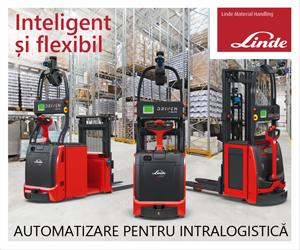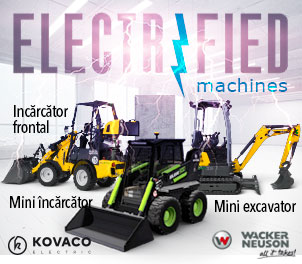Eggersmann upgrades the BACKHUS windrow turners
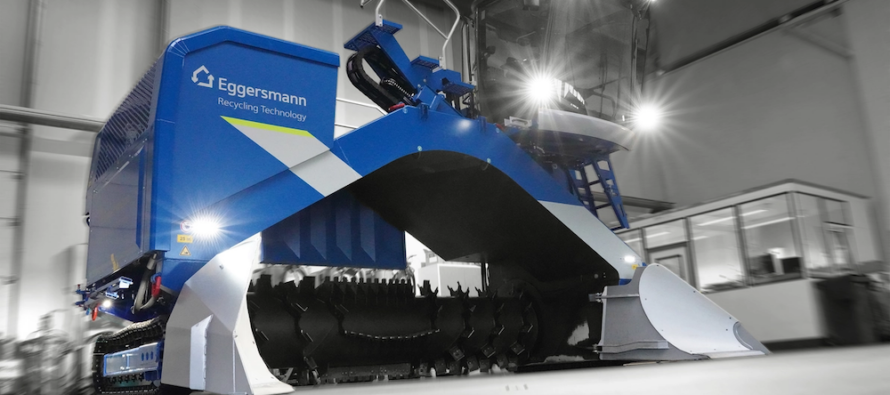
Story Highlights
- Eggersmann
- intorcator de brazda Eggersmann Backhus
- BACKHUS windrow turners
- recycling technology
Related Articles
From the track clearers to the engine and the cabin, Eggersmann has given its BACKHUS windrow turners a general overhaul. Aspects such as lighting and remote maintenance have also undergone comprehensive upgrades.
New cabin for more safety and comfort
The most noticeable change is the new CLAAS X11 cabin, which provides a visual facelift. This cabin, including modern interior fittings, will be used as standard on the BACKHUS models from A 45 to A 75 from now on.
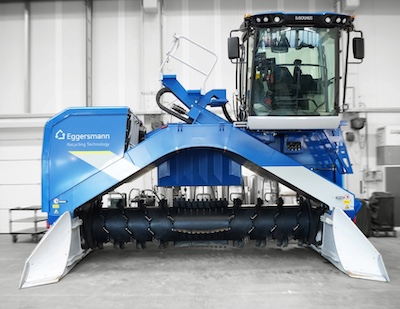 “The new panoramic cabin significantly surpasses the already excellent all-round visibility of the previous model,” explains Eric Sandmann as Product Manager for Turning Technology at Eggersmann. “Better visibility automatically means more safety. That is why we have now also integrated the adjustable and heated side mirrors into the standard equipment.”
“The new panoramic cabin significantly surpasses the already excellent all-round visibility of the previous model,” explains Eric Sandmann as Product Manager for Turning Technology at Eggersmann. “Better visibility automatically means more safety. That is why we have now also integrated the adjustable and heated side mirrors into the standard equipment.”
Windscreen wipers on each side are also part of the new standard, so that the benefits of the panoramic view are maintained even in poor weather and when the machine is covered in dirt. In addition to these aspects, Eggersmann also offers a camera package if required. Here the concept has been completely redesigned as part of the current measures, too. With four cameras, the area behind the machine can also be kept permanently in view.
From now on, every BACKHUS A 45 to A 75 will also have a KAT 4 filter system as standard, thus fulfilling the highest requirements for filter systems in accordance with the EU standard. An optional upgrade with a protective ventilation system in accordance with DGUV 201-004 is also possible.
Optimized control technology and more standardised mechanics
The introduction of the new cabin generation goes along with some decisive technical changes. “We saw the implementation of the X11 cabin as an opportunity to fundamentally modernise the electrical engineering of the BACKHUS A 45 to A 75 series. From the circuit boards to the display, we have revized a large number of components,” summarises Sandmann.
The 12-inch display has been replaced by a newer version with more power and the interactive operating software has been completely modernised with the aim of maximising intuitive operation.
 “As self-propelled machines, the BACKHUS windrow turners are very different from the shredders and screening machines in our product range, but we’ve nevertheless come closer to the One-Logic principle of the other Eggersmann mobile machines,” adds Sandmann.
“As self-propelled machines, the BACKHUS windrow turners are very different from the shredders and screening machines in our product range, but we’ve nevertheless come closer to the One-Logic principle of the other Eggersmann mobile machines,” adds Sandmann.
A detailed overview of the performance data can be called up at any time and provides precise information on efficiency. Remote maintenance is also made considerably easier thanks to a real-live query of all relevant values. A whole series of additional sensors has been added to provide the most comprehensive overview possible.
“Our service can now query even more data. An additional integrated modem also enables worldwide remote access to the control and display for direct customer support. This maximises machine availability,” says Sandmann, explaining the new features.
In addition, the modernization of the technical and mechanical components also went hand in hand with greater standardization. According to Sandmann, this not only facilitates maintenance and the supply of spare parts, but also has a decisive impact on retrofitting the windrow turners.
“Our BACKHUS windrow turners not only have extensive standard equipment, but also the widest range of customisation options on the market. The optional Eggersmann Management System, for example, adjusts the undercarriage and rotor speed precisely to the resistance of the material. The diesel engine then adapts its speed accordingly, resulting in fuel savings of up to 15%. Now we will be able to implement this system more quickly in future. We have also managed to significantly reduce the investment costs, meaning that the system will amortise even faster by reducing operating costs permanently. At the same time, it also improves the CO2 footprint.
Variably adjustable lighting concept
The lighting concept was also updated along with the cabin. Strategic placement of low-consumption LED spotlights around the machine now enables targeted illumination of different areas. The new concept consists of a main lighting system, a working area lighting system and a track lighting system.
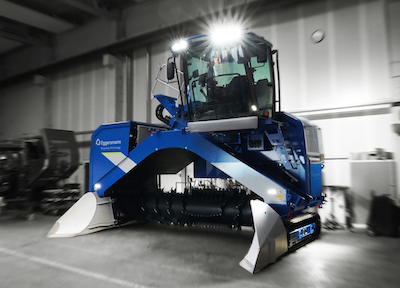 The main lighting uses several spotlights at the front and rear at the top of the cabin to provide general illumination of the surroundings while the machine is in use. In addition, four special spotlights for the working area in front of and behind the windrow turner ensure optimum visibility when travelling over the windrow. Eight further spotlights are mounted around the machine directly above the tracks. This means that not only the track clearers but also the driving lanes can be illuminated. Individual aspects of the lighting can be variably adjusted.
The main lighting uses several spotlights at the front and rear at the top of the cabin to provide general illumination of the surroundings while the machine is in use. In addition, four special spotlights for the working area in front of and behind the windrow turner ensure optimum visibility when travelling over the windrow. Eight further spotlights are mounted around the machine directly above the tracks. This means that not only the track clearers but also the driving lanes can be illuminated. Individual aspects of the lighting can be variably adjusted.
Upgrade for track clearer and HD hose drum
The design of the track clearers has also been adapted based on years of practical experience. The most important innovation here are the replaceable PE-HD covers. Thanks to their particularly smooth surface, these enable more effective pick-up and transfer of the material into the tunnel and to the rotor. Not only does this have a positive effect on the clearing properties, it also reduces the pressure on the chassis.
Side conveyor, fleece winder, concentrate spraying system – there are various options for customizing the BACKHUS windrow turners to a specific application. One of these options is an irrigation system. The HD hose drum of this system has received an extensive upgrade, too. The electric drive, axle shaft and radio system have been renewed and an external fan has been added to cool the drive.
A variety of applications in high-demand
As the BACKHUS windrow turners efficiently compost not only manure, green waste and food remains, but also any other organic material from fermentation residue to empty fruit husks, they have become an essential component in the waste treatment of a wide range of production processes. They are also used in the biological drying of municipal waste and are suitable for special applications such as soil remediation – for example, soil contaminated with paraffin.


